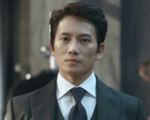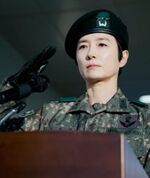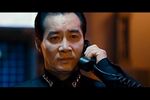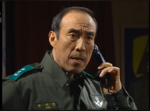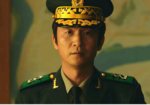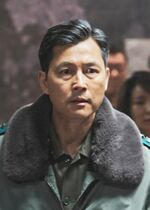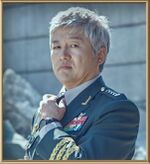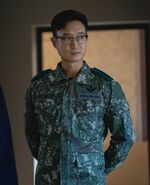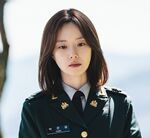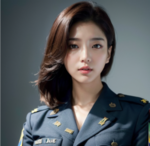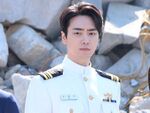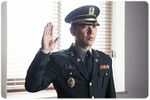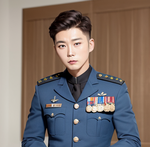Royal Joseon Armed Forces: Difference between revisions
No edit summary |
|||
| Line 20: | Line 20: | ||
| age = 18 - 60 | | age = 18 - 60 | ||
| conscription = Yes | | conscription = Yes | ||
| active = 1, | | active = 1,020,000 | ||
* Army: | * Army: 415,500 | ||
* Navy: | * Navy: 254,000 | ||
** Marine Corps: 59,000 | ** Marine Corps: 59,000 | ||
* Air Force: | * Air Force: 289,000 | ||
* Royal Guard: 2,500 | * Royal Guard: 2,500 | ||
| reserve = 4,642,300 | | reserve = 4,642,300 | ||
| Line 46: | Line 46: | ||
The '''Royal Joseon Armed Forces''' is a military organization under the command of the prime minister, the minister of defense, and the military commanders. Its duties include defending its national territory, counterterror operations, and carrying out military operations to improve [[Joseon]]'s national interests. | The '''Royal Joseon Armed Forces''' is a military organization under the command of the prime minister, the minister of defense, and the military commanders. Its duties include defending its national territory, counterterror operations, and carrying out military operations to improve [[Joseon]]'s national interests. | ||
The Royal Joseon Armed Forces focuses on securing tactical advantages through qualitative advantages of troops rather than quantitative advantages. The Army, Navy, and Air Force secure tactical advantages over other countries' armed forces by receiving state-of-the-art equipment that may not be large in numbers but with outstanding performance. All the troops also continue to complete various and in-depth military exercises tailored to their respective missions. | |||
After completing their military service, Joseon's men and women who have completed active service will join the reserve army for five years after their discharge. The reserve soldiers will undergo military training | [[Joseon]] has a conscription system for adult males aged 18 or older who have passed physical and mental examinations. In general, only 20% of those conscripted pass physical and psychological examinations and actually join the military. Women can apply to join the military as noncommissioned officers or officers, and as of 2023, the proportion of women among officers and noncommissioned officers in the Royal Joseon Armed Forces was 40%. As of 2034, Joseon's active force is 1,020,000, while the reserve force is 4,642,300. | ||
After completing their military service, Joseon's men and women who have completed active service will join the reserve army for five years after their discharge. The reserve soldiers will undergo military training five days a year during their daily lives. In case of emergency, the reserve soldiers will be mobilized by the prime minister's mobilization order to serve as military troops. The reserve soldiers complete specialized military exercises of sufficient intensity over a short time. | |||
Joseon is a country that possesses strategic and tactical nuclear weapons. Since the successful nuclear development in the 1950s, Joseon has maintained many nuclear assets. Joseon's ability to operate nuclear weapons is maintained by Air Force strategic bombers and the army's ballistic missiles, centering on the navy's SSBN submarines. | Joseon is a country that possesses strategic and tactical nuclear weapons. Since the successful nuclear development in the 1950s, Joseon has maintained many nuclear assets. Joseon's ability to operate nuclear weapons is maintained by Air Force strategic bombers and the army's ballistic missiles, centering on the navy's SSBN submarines. | ||
Revision as of 01:37, 13 September 2024
| Royal Joseon Armed Forces | |
|---|---|
| Wanglib Joseon Guggun(왕립 조선 국군) | |
| Service branches | |
| Headquarters | Gyeryongdae, Chungcheongnam-do |
| Leadership | |
| Prime Minister | Prime Minister Park Yohan |
| Minister of Defense | Lee Hyeyul |
| Personnel | |
| Military age | 18 - 60 |
| Conscription | Yes |
| Active personnel | 1,020,000
|
| Reserve personnel | 4,642,300 |
| Expenditure | |
| Budget | $ 461,426,557,799 |
| Percent of GDP | 3.8 % |
| Industry | |
| Domestic suppliers |
|
| Foreign suppliers |
|
The Royal Joseon Armed Forces is a military organization under the command of the prime minister, the minister of defense, and the military commanders. Its duties include defending its national territory, counterterror operations, and carrying out military operations to improve Joseon's national interests.
The Royal Joseon Armed Forces focuses on securing tactical advantages through qualitative advantages of troops rather than quantitative advantages. The Army, Navy, and Air Force secure tactical advantages over other countries' armed forces by receiving state-of-the-art equipment that may not be large in numbers but with outstanding performance. All the troops also continue to complete various and in-depth military exercises tailored to their respective missions.
Joseon has a conscription system for adult males aged 18 or older who have passed physical and mental examinations. In general, only 20% of those conscripted pass physical and psychological examinations and actually join the military. Women can apply to join the military as noncommissioned officers or officers, and as of 2023, the proportion of women among officers and noncommissioned officers in the Royal Joseon Armed Forces was 40%. As of 2034, Joseon's active force is 1,020,000, while the reserve force is 4,642,300.
After completing their military service, Joseon's men and women who have completed active service will join the reserve army for five years after their discharge. The reserve soldiers will undergo military training five days a year during their daily lives. In case of emergency, the reserve soldiers will be mobilized by the prime minister's mobilization order to serve as military troops. The reserve soldiers complete specialized military exercises of sufficient intensity over a short time.
Joseon is a country that possesses strategic and tactical nuclear weapons. Since the successful nuclear development in the 1950s, Joseon has maintained many nuclear assets. Joseon's ability to operate nuclear weapons is maintained by Air Force strategic bombers and the army's ballistic missiles, centering on the navy's SSBN submarines.
The Royal Joseon Armed Forces are composed of the Army, Navy, and Air Force. The Army is tasked with defending Joseon's territories, people, and interests from threats on the ground. The majority of divisions in the Army are composed of armored divisions or mechanized infantry divisions. The Navy is made up of 2 coastal defense flotillas, 6 aircraft carrier fleets, and 2 amphibious assault fleets. Each coastal defense flotilla is made up of 15 coastal defense ships, and each aircraft carrier fleet is made up of 1 or 2 carrier strike groups. In addition, the Navy is a unit that operates strategic nuclear weapons and has the character of a strategic force. The Air Force consists of 36 fighter wings and various units that support them. Like the Navy, the Air Force is also operating strategic nuclear weapons. The Space Command, also under the Air Force, is in charge of space assets, including military satellites and unmanned space shuttles.
Command structure
The Royal Joseon Armed Forces has the prime minister as its commander-in-chief and is commanded by the minister of defense and other commanders. All other commanders except the prime minister and the defense minister are made up of active duty soldiers.
The Royal Joseon Armed Forces are controlled by the principles of civil control. Only civilians or retired soldiers can serve as minister of defense, and active duty soldiers cannot serve as minister of defense.
Branches
Army
The Royal Joseon Army is the largest branch of the Royal Joseon Armed Forces. The Army consists of 451,500 troops, and is centered on infantry units specialized in mountain combat capabilities, and mechanized units consisting of armored vehicles. As of 2033, the Army accounted for the largest portion of the defense budget.
The Royal Joseon Navy is classified as a Blue-water navy capable of smooth military operations in the distant oceans. The Navy has many aircraft carriers, cruisers, destroyers, and nuclear-powered submarines. Its coastal defense forces are considered relatively small. Recently, the Navy has been strengthening its unmanned weapons operations capabilities by increasing unmanned combat assets.
Air Force
The Royal Joseon Air Force is a branch that is responsible for space assets as well as aerial operations. The Air Force is responsible for controlling air supremacy and supporting the Army and Navy using fighter jets and bombers. The majority of the Air Force's fighter jets are made up of 5th-generation stealth fighters, and the Royal Joseon Air Force is considered one of the most modernized air forces in the world.
Current military command
| Position | Photo | Name | Service | Born date | Nominated by |
|---|---|---|---|---|---|
| Prime Minister of Joseon | Prime Minister Park Yohan |
- | February 15th, 1981 | - | |
| Minister of Defense | Minister of Defense Lee Hyeyul |
Royal Joseon Navy(Retired) | April 12, 1989 | Park Yohan | |
| Chairman of the Joint Chiefs Staff | General Adrian Quaritch |
Royal Joseon Marine Corps | August 6th, 1970 | Park Yohan | |
| The Chief of Staff of the Army | General Do Seong Hwa |
Royal Joseon Army | December 7th, 1968 | Park Yohan | |
| The Chief of Naval Staff | Admiral Lim Kyungtae |
Royal Joseon Navy | July 30th, 1968 | Park Yohan | |
| Air Force Chief of Staff | General Kim Seyoung |
Royal Joseon Air Force | May 9th, 1979 | Park Yohan | |
| Marshal of the Army | General Jang Ju-Tae |
Royal Joseon Army | June 4th, 1965 | Jeong Do-Hyung | |
| Marshal of the Army | General Kim Bum-Seok |
Royal Joseon Army | May 15th. 1965 | Jeong Do-Hyung | |
| The Capital Defense Commander | General Jeong Tae-Shin |
Royal Joseon Army | June 4th, 1972 | Jeong Do-Hyung | |
| Commanding General Ground Operations Command | General Choi Gwan-mook |
Royal Joseon Army | November 8th, 1969 | Park Yohan | |
| Commander of Defense Intelligence Agency | General Han Tae-Seob |
Royal Joseon Army | February 15th , 1979 | Park Yohan | |
| Commander of the VII Maneuver Corps | General Lee Dami |
Royal Joseon Army | September 14th, 1987 | Jeong Do-Hyung | |
| Commander of the 3rd Fleet | Admiral Song Do-Hee |
Royal Joseon Navy | March 14th, 1989 | Park Yohan | |
| Commander of the 5th Fleet | Admiral Oh Young-Chul |
Royal Joseon Navy | November 11th, 1988 | Park Yohan | |
| Air Force Operations Commander | General Park Daehyun |
Royal Joseon Air Force | September 8th, 1977 | Park Yohan | |
| Commander of 17th Fighter Wing | General Sung Hanseok |
Royal Joseon Air Force | May 7th, 1988 | Park Yohan |
Equipment
Infantry firearms
Armored Vehicles
Artillery
Anti-Air Equipment
Ships
Aircraft
